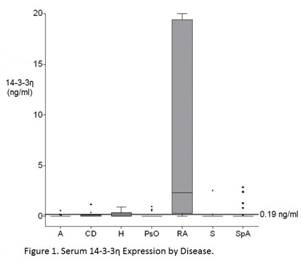Session Information
Session Type: ACR Poster Session C
Session Time: 9:00AM-11:00AM
Background/Purpose: 14-3-3η is an emerging
soluble Rheumatoid Arthritis (RA) biomarker that activates intracellular
pathways that lead to the upregulation of inflammatory and joint damage
factors. It is reported to be highly specific and sensitive for RA as a
diagnostic marker, higher levels are associated with greater joint damage
progression risk1,2 and 14-3-3η’s modulation with treatment
suggests a role in disease monitoring. In
this study, we examine the specificity of 14-3-3η in an independent,
clinically well-characterized cohort of moderate to severe RA and disease
control subjects.
Methods: Serum 14-3-3η levels were
measured in a total of 147 patients using the Augurex 14-3-3η ELISA. The
patient set comprised 36 with RA and 111 controls consisting of 20 with asthma
(A), 20 with Crohn’s Disease (CD), 12 presumed healthy (H), 16 with psoriasis
(PsO), 20 with sarcoid arthritis (S), and 23 with spondylarthropathies (SpA). Sample
testing was done independently of Augurex. Mann-Whitney testing together with
Kruskal-Wallis analysis with the post-hoc Dunn’s multiple comparison test was
performed to assess group differences. Receiver operator characteristic curve
(ROC) analysis was performed to assess the specificity of 14-3-3η for RA.
Results: Median (IQR) serum 14-3-3η levels
were significantly higher in RA [2.35ng/ml (0.28-19.41)] than all controls [0
(0-0)], p<0.0001. ROC curve analysis further underscored this differential
expression yielding a significant area under the curve (AUC) of 0.86,
p<0.0001. At the diagnostic positivity cut-off of ≥0.19 ng/ml, the ROC
curve delivered a sensitivity of 81% with a corresponding specificity of 84%.
Kruskal-Wallis testing revealed that serum 14-3-3η levels were
significantly higher in RA in comparison to all other diseases, p<0.0001.
This differential expression is illustrated in Figure 1.
Conclusion: Serum 14-3-3η is a highly
specific RA biomarker. As a novel mechanistic disease factor, 14-3-3η is
expected to provide new insights and approaches to RA management and clinical
studies.
References: 1Arthritis Res Ther
2014; 16(2):R99; 2J Rheumatol 2014; 41(11):2104.
To cite this abstract in AMA style:
Dasgupta B, Cherkas Y, Lamberth S, Hayden K, Brodmerkel C, Marotta A, Curran M. Serum 14-3-3η Is an RA Specific Mechanistic Marker [abstract]. Arthritis Rheumatol. 2015; 67 (suppl 10). https://acrabstracts.org/abstract/serum-14-3-3-is-an-ra-specific-mechanistic-marker/. Accessed .« Back to 2015 ACR/ARHP Annual Meeting
ACR Meeting Abstracts - https://acrabstracts.org/abstract/serum-14-3-3-is-an-ra-specific-mechanistic-marker/

